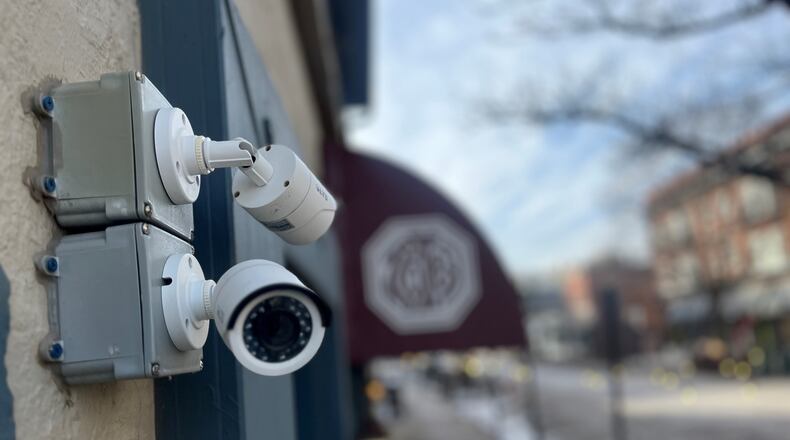“This is to simplify the investigation process for officers and detectives and to make a safer response when responding critical incidents,” said Major James Mullins, commander of the Dayton Police Department’s Community Services Division.
Some cities have embraced law enforcement’s use of private security camera networks, while others rejected it primarily over concerns about privacy, surveillance and potential misuse.
Dayton’s proposal would be in addition to the police department’s controversial plans to install fixed-site automated license plate reader cameras in neighborhoods that officials say want the devices.
Melissa Bertolo, a member of the Coalition on Public Protection, said she still has many unanswered questions about the proposed technology and network of private cameras, including how much the system could cost, how it will be used and whether video footage will be public record.
Private cameras
The Dayton Police Department proposes deploying technology from a company called Fusus that can help law enforcement agencies access video from a network of private security cameras.
Fusus provides police with “conditional” access to real-time video streaming and video recordings, according to an impact report that the Dayton Police Department released ahead of a public hearing about the technology that will be held later this month.
The system is entirely voluntary, and private businesses, organizations and other property owners can choose under what circumstances police are allowed to access their video feeds and recordings, said Major Mullins.
The police department’s impact report gives an example that businesses or schools could choose to make camera feeds and video accessible only when they activate panic alarms during emergencies.
Private groups also could decide to only allow police video access when the owners approve requests submitted by law enforcement, the report states.
Even if police have full access to private cameras, police personnel will not monitor them full time and will check them only when there are incidents, and these cameras are in places where people should have no expectation of privacy, Mullins said.
Dayton police also want to establish a camera registry to help create a map of private cameras in areas of the city.
Camera registration is voluntary, but Mullins said the system would help law enforcement quickly identify private cameras that may have useful video evidence and it also should help speed up the process by which police can submit requests for video from privately owned cameras.
Registered businesses would provide contact information for police video requests.
Identifying private security cameras and obtaining video footage from them can be very time-consuming for officers, hampering investigations, Mullins said.
Trotwood, Miamisburg, West Carrollton, Cleveland, Toledo and the Montgomery County Sheriff’s Office use this technology, as well as some major U.S. cities, like Atlanta, Minneapolis, Miami and Dallas, according to Mullins.
Not in support
But some cities and privacy rights organizations have come out against law enforcement’s use of Fusus and other similar types of video aggregation technology.
For instance, the ACLU of Northern California decried San Francisco police’s request for such a system, saying cameras were wrongfully used for mass surveillance during racial justice protests.
Columbia, Missouri, late last year voted against using Fusus technology after residents shared privacy concerns and some alleged the system could be misused, impacting marginalized groups, and could help create a police surveillance state.
Bertolo said the camera registry sounds like a good idea, but she wants more information about how the proposed private camera network would work.
She said police have not shared how much this technology could cost, which is an important consideration. Bertolo said this proposal raises questions around using private resources for public use.
“Ultimately, I have a lot more questions,” said Bertolo, who added that she hopes to attend another public session on this proposal. There are five more informational sessions planned leading up to a city public hearing on the technology on Feb. 15.
Bertolo also said community feedback from these sessions should be included and worked into the police department’s impact report and proposed policy.
Police are asking the city commission to launch a pilot program implementing a Fusus system in downtown that officials say will not cost the city a dime, because it will be funded by the Ohio Attorney General’s Office.
However, Mullins said he does not know how much the system could cost after the pilot period ends in late June.
Mullins said businesses, apartments and other commercial and institutional property owners would be expected participate in the program. He said residential cameras will not be involved at this time though they could be added later.
Police in other communities have been given access to live video from private residential cameras, such as popular doorbell cameras made by companies like Ring, Nest, Blink, Wyze and Arlo.
Melinda Hinesmon, 62, was one of just a few people who attended a public informational meeting about the issue Tuesday in West Dayton.
She said she thinks this technology could be beneficial because it sounds like it can take police days to get video that assists in their investigations.
“If this sticks to the purpose of keeping our community safe, then we should be OK,” said Hinesmon, who lives in northwest Dayton.
Julia Capers, who lives in the Pineview neighborhood, said she attended Tuesday’s event because residents need to know what is being proposed in their neighborhoods.
She said she has concerns about the technology, and she’d like to see some citizen oversight included in the process.
Meetings on cameras
The Dayton Police Department will host public informational meetings on proposed Fusus technology at the following times and dates:
* 6 p.m. Thursday, Feb. 2, Northwest Recreation Center, 1600 Princeton Drive;
* 11 a.m. Tuesday, Feb. 7, Central Church of the Nazarene, 610 Brown St. (Swahili interpreter available);
* 6 p.m. Tuesday, Feb. 7, Osman Gazi Mosque, 1508 Valley St. (Turkish interpreter available);
* 11 a.m. Thursday, Feb. 9, Dayton Dream Center, 2720 E. Third St. (Spanish interpreter available);
* 6 p.m. Thursday, Feb. 9, Northwest Recreation Center, 1600 Princeton Drive.
About the Author


